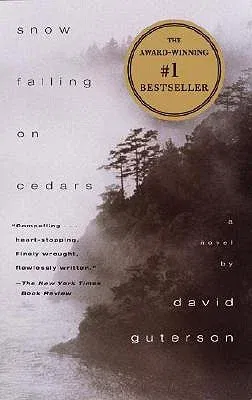On San Piedro, an island of rugged, spectacular beauty in Puget Sound,
home to salmon fishermen and strawberry farmers, a Japanese-American
fisherman stands trial, charged with coldblooded murder. The year is
1954, and the shadow of World War II, with its brutality abroad and
internment of Japanese Americans at home, hangs over the courtroom.
Ishmael Chambers, who lost an arm in the Pacific war and now runs the
island newspaper inherited from his father, is among the journalists
covering the trial - a trial that brings him close, once again, to
Hatsue Miyomoto, the wife of the accused man and Ishmael's
never-forgotten boyhood love. Hatsue and Ishmael, in the years before
the war came between them, had dug clams together, picked strawberries
in San Piedro's verdant fields, and passed long hours in the secrecy of
a giant hollow cedar tree. Now, as a heavy snowfall surrounds and
impedes the progress of Kabuo Miyomoto's trial, they and the other
participants must come to a reckoning with the past, with culture,
nature, and love, and with the possibilities of the human will. Both
suspenseful and beautifully crafted, Snow Falling on Cedars portrays the
psychology of a community, the ambiguities of justice, the racism that
persists even between neighbors, and the necessity of individual moral
action despite the indifference of nature and circumstance.

